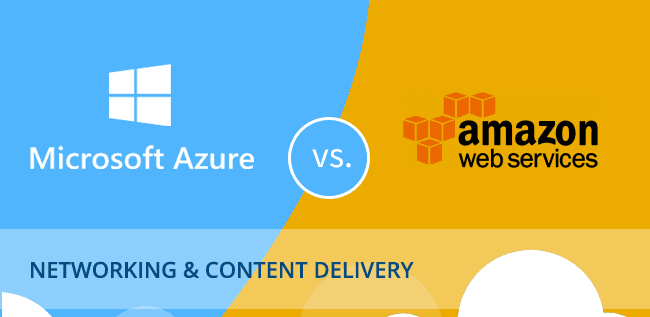
In line with our latest blog series highlighting how common cloud services are made available via Azure and Amazon Web Services (AWS), as published by Microsoft, this third blog in the series helps you understand Cloud Networking and Content Delivery capabilities of both Azure and AWS.
| Before we jumpstart on the actual comparison chart of Azure and AWS, we would like to bring you some basics on cloud content delivery networking and the current trends on the subject. If you would rather like to have quick look at the comparison table, click here |
When we talk about cloud Content Delivery Network (CDN) and the related networking capabilities it includes all the hardware and software that allows you to easily provision private networks, connect your cloud application to your on-premises datacenters, and more.
According to Gartner, Content delivery networks (CDNs) are a type of distributed computing infrastructure, where devices (servers or appliances) reside in multiple points of presence on multi-hop packet-routing networks, such as the Internet, or on private WANs. A CDN can be used to distribute rich media downloads or streams, deliver software packages and updates, and provide services such as global load balancing, Secure Sockets Layer acceleration and dynamic application acceleration via WAN optimization techniques.
In simpler terms, this highly distributed server platforms are optimized to deliver content in a way that improves customer experience. Hence, it is important to decrease latency by keeping the data closer to the users, protect it from security threats while ensuring rapid streamlined content delivery including general web delivery, content purge, content caching and tracking history as long as 90 days.
As per G2Crowd.com, most organizations use CDN services, such as web caching, request routing, and server-load balancing, to reduce load times and improve website performance. Further to qualify as a CDN provider, a service provider must:
- Allow access to a geographically dispersed network of PoPs in multiple data centers
- Help websites access this network to deliver content to website visitors
- Offer services designed to improve website performance
- Provide scalable Internet bandwidth allowances according to customer needs
- Maintain data center(s) of servers to reduce the possibility of overloading individual instances
With this background, let’s look at the AWS vs Azure comparison chart in terms of Networking and Content Delivery Capabilities:
| Service | Description | AWS | Azure |
|---|---|---|---|
| Cloud virtual networking | Provides an isolated, private environment in the cloud. | Virtual Private Cloud | Virtual Network |
| Cross-premises connectivity | Connects Azure virtual networks to other Azure virtual networks or customer on-premises networks. It also supports VPN tunneling. | AWS VPN Gateway | VPN Gateway |
| Domain name system management | Manage DNS records using the same credentials, billing, and support contract as other Azure services. Service that hosts domain names, routes users to Internet applications, manages traf c to apps, and improves app availability with automatic failover. | Route 53 Route 53 | DNS Traffic Manager |
| Content delivery network | Global content delivery network that transfers audio, video, applications, images, and other les. | CloudFront | Content Delivery Network |
| Dedicated network | Establishes a dedicated, private network connection from a location to the cloud provider. | Direct Connect | ExpressRoute |
| Load balancing | Automatically distributes incoming application traf c to add scale, handle failover, and route to a collection of resources. | Elastic Load Balancing | Load Balancer Application Gateway |
To read more about the Microsoft guide which briefs all about cloud by drawing comparisons between Azure or AWS, click here (link to PDF download)
You may also like to read our previous blogs in these series, if so, please click here:
https://www.cloudiqtech.com/azure-vs-aws-compute/
https://www.cloudiqtech.com/aws-vs-azure-cloud-storage/
Share this:

CloudIQ is a leading Cloud Consulting and Solutions firm that helps businesses solve today’s problems and plan the enterprise of tomorrow by integrating intelligent cloud solutions. We help you leverage the technologies that make your people more productive, your infrastructure more intelligent, and your business more profitable.
LATEST THINKING
INDIA
Chennai One IT SEZ,
Module No:5-C, Phase ll, 2nd Floor, North Block, Pallavaram-Thoraipakkam 200 ft road, Thoraipakkam, Chennai – 600097
© 2023 CloudIQ Technologies. All rights reserved.

